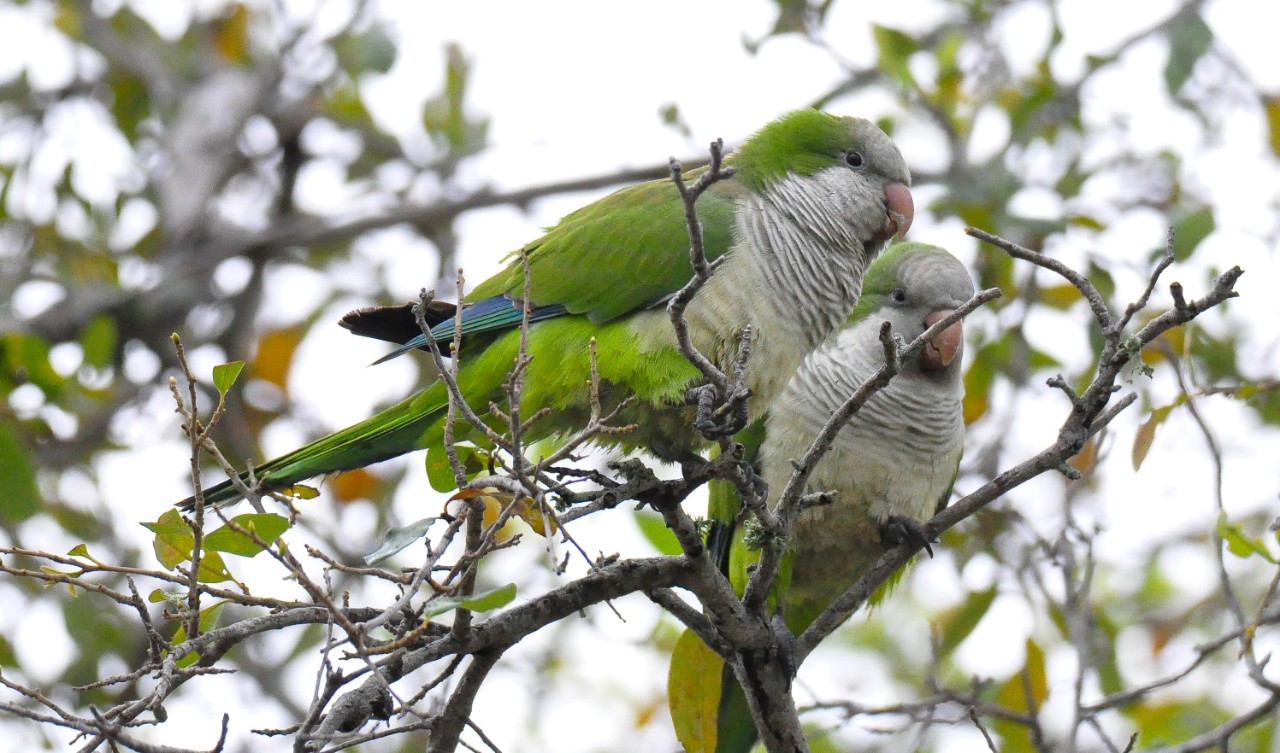
Scientific American: Parrots are taking over the world
UC researcher explains why parrots are so adaptable
Scientific American turned to a University of Cincinnati researcher to explain what makes parrots so adaptable, particularly in cities they share with people.
According to the magazine, at least 60 of the world's 380 parrot species have breeding populations outside their historic geographic range. These transplants are thriving in new places where they have learned to adapt.
“They're animals that are really social. They live in cognitively complex social environments,” Grace Smith-Vidaurre, a postdoctoral fellow at the University of Cincinnati, told Scientific American. “They're like humans in a lot of ways.”
Smith-Vidaurre studies birds in UC Assistant Professor Elizabeth Hobson's lab.
Monk parakeets, in particular, have adapted to city life in places like Chicago, New Jersey, and Brooklyn, New York. They were introduced to the United States from South America through the pet trade.
So far, concerns that monk parakeets would become an agricultural pest in the United States have not come true. Instead, they seem to enjoy city life.
Now Smith-Vidaurre is comparing the vocalizations of the U.S. birds to those found in their native South America. She found that the calls made by birds living in this noisy city soundscape are less complex than those found in South America.
“Something about their environment might be constraining their ability to produce or perceive these vocal signatures,” she says.
Read the Scientific American story.
Featured image at top: Monk parakeets perch in a tree in Cape Coral, Florida. These nonnative, invasive species are thriving in many cities across the United States. Photo/Michael Miller
More UC biology in the news

UC Assistant Professor Elizabeth Hobson works with a parakeet in a flight cage in Florida. Photo/Provided
Related Stories
Designing the next generation of drug delivery
July 18, 2024
UC Assistant Professor Briana Simms talks to PhRMA about using nanoparticles to deliver medicine.
Mural by UC grad honors U.S. military history
July 17, 2024
Local 12 highlighted a new mural by University of Cincinnati graduate and artist Brandon Hawkins that pays tribute to U.S. military history.
Social media fuels extreme political rhetoric
July 17, 2024
UC College of Arts and Sciences Professor Jeffrey Blevins tells Local 12 that online algorithms fuel political polarization on social media.
NIS program opens new horizons for international student
July 17, 2024
In his pursuit of physics and a taste for research, Akash Khanikor ventured from his hometown in India's Assam to the University of Cincinnati, drawn by the promise of hands-on exploration early in his undergraduate career as a NEXT Innovation Scholar.
UC archivist explores Troy’s invisible workers
July 17, 2024
UC Classics archivist Jeff Kramer examined the unheralded and largely uncredited role laborers played in the 1930s excavation at Troy in Turkey.
From intern to full-time: Recent Lighting Design grad joins Bandit Lites
July 16, 2024
Lighting & Sound America spotlights recent graduate Riley Rowan's new position at Bandit Lites, a full-service design, management and producer of live events and entertainment.
CCM alum Donald Lawrence to be inducted into Cincinnati Black Music Walk of Fame
July 16, 2024
UC College-Conservatory of Music alumnus Donald Lawrence is part of the 2024 class of Cincinnati Black Music Walk of Fame inductees. Located at the Banks in downtown Cincinnati, the induction ceremony on July 27 will feature a parade of stars and a free concert by the Zapp Band.
U.S. stroke survival is improving, but race still plays role
July 16, 2024
U.S. News & World Report, HealthDay and Real Health covered new research from the University of Cincinnati that found overall rates of long-term survival following stroke are improving, but Black individuals experience worse long-term outcomes compared to white individuals.
Presidential challenge to UC: Join Ride Cincinnati to fight cancer
July 16, 2024
UC President Neville Pinto has again challenged every UC college and unit to send at least one rider to the September 14 Ride Cincinnati event to help fundraise for cancer research and cancer care. UC students ride free. Signup by July 31 for free UC-branded cycling jersey.
Pediatric ICU rates linked to housing quality, income, education
July 16, 2024
Healio highlighted research led by the University of Cincinnati and Cincinnati Children's Hospital's Carlie Myers that found a link between pediatric ICU admission rates and housing quality, household income and education.
